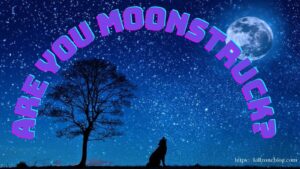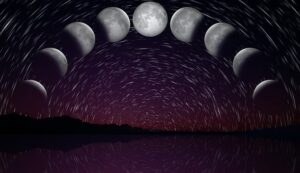 For the last few days, I’ve felt off. Writing had been difficult. Words refused to flow. Pumping out a decent chapter likened to delivering a 10 lb. baby with wide shoulders and oversized head. Even my playlists didn’t match my mood.
For the last few days, I’ve felt off. Writing had been difficult. Words refused to flow. Pumping out a decent chapter likened to delivering a 10 lb. baby with wide shoulders and oversized head. Even my playlists didn’t match my mood.
And sure, moments of melancholy go hand-in-hand with the holidays, but that wasn’t it. So, like I often do, I turned to nature for the answer. Specifically, the ebb and flow of the Moon.
When the lunar calendar showed the waning crescent phase, I’d found my answer. We’ve done battle before, her and I.
The waning crescent means one thing: early nights. With the final stretch of this lunar cycle, it’s normal to feel exhausted by the past month and want to unwind as the New Moon approaches. It’s also a time of reflection. Perfect time for journaling and self-care.
I’ve long known how the Moon affects me. It’s undeniable. I also know my views may conflict with yours, and that’s okay. We’re writers, after all. It’s our job and passion to question the mysteries of life.
Why would I believe the Moon is responsible for my lackadaisical mood?
I’m glad you asked. 😉
Let’s first look at the composition of the human body.
According to the Journal of Biological Chemistry 158:
- An adult human body is made up of about 60% water.
- The brain and heart consist of 73% water.
- Lungs are about 83% water.
- Skin has 64% water.
- Muscles and kidneys are 79% water.
- Even bones are 31% water.
The above percentages vary by age, gender, and where people reside. An adult male, for example, needs about 3 liters per day of water while an adult female only needs 2.2 liters. Some of which we derive from food. Keep in mind, fat tissue doesn’t have as much water as lean tissue.
Infants are born with the most water — about 78% of their body. By their first birthday, that number decreases to about 65%.
Water serves several essential functions:
- first acts as a building material, then provides nutrients to every cell in the body
- regulates internal body temperature through sweating and respiration
- metabolizes and transports carbohydrates and proteins in food to the bloodstream
- assists in flushing waste through urination
- acts as a shock absorber for brain, spinal cord, and fetus
- creates saliva
- lubricates joints
With all the water in our bodies, how could the Moon not affect us?
If you’re still not convinced, perhaps it’ll help to understand how and why the Moon wields great power.

Tides
The Moon’s gravitational pull generates something called “the tidal force.” The tidal force causes Mother Earth — and its water — to swell on the sides closest and farthest from the Moon. These bulges of water are high tides. As the Earth rotates, our regions pass through both stages every day. If we’re in one of the bulges, we receive a high tide. If we’re not, it results in a low tide. This cycle of two high tides and two low tides occurs on almost all of the world’s coastlines. The rare exception is when the tide circles around an island, like in New Zealand.
In addition to the tides, the Moon controls time, light, and stable seasons.
For many animals, particularly birds, the Moon is essential to migration and navigation. Others will time their reproduction to coincide with the specific phases of the lunar cycle. There’s also a whole world of fascinating adaptations relating to tides and the unique properties of moonlight.
Power of Lunar Cycle
The lunar cycle changes circadian rhythms — day/night cycles driven by Earth orbiting the Sun. Human circadian rhythms are easily thrown off by jet lag or when we change the clocks. But circalunar rhythms, which are tied to lunar cycles, can also impact us.
Circalunar rhythms are difficult to discern, but they effect different types of organisms. Some animals respond to both a circadian rhythm and a lunar clock. I recently wrote an in-depth article about why animals don’t get lost that may interest you.
“The Moon has been up there as long as evolution has been taking place, and lunar rhythms are embedded in the life cycles of many organisms. The challenge is working out when the Moon truly is a factor and what is merely myth and legend.”
— Dr. Tom White, Senior Curator of Natural History Museum
Day Length
The gravitational pull of the Moon is slowing Earth’s rotation, an effect known as “tidal braking,” which increases the length of our day by 2.3 milliseconds per century. Early Earth was spinning at a much faster rate. According to computer models, we had a six-hour day 4.5 billion years ago. Since then, with the help of our Moon, the Earth’s rotation has been slowing. The result is longer days.
Seasons
The giant impact that formed the Moon may have tipped the Earth and contributed to the 23.5° tilt of our North Pole. This tilt gives us our seasons.
The Moon’s gravitational pull acts like training wheels for Earth on its journey around the Sun, and keeps the axis pointed at a consistent angle. Without the Moon, the Earth’s stately progression through spring, summer, fall, and winter would have massive fluctuations.
If the Moon controls tides (with help from our Sun), time, light, and seasons, it’s naïve to think it can’t impact human life. Or maybe, you’ve never given it much thought.
Fair enough. We do live busy lives and have different interests.
A few fun facts:
- Behaviors of several species have been linked to lunar periodicity.
- The word “lunacy” stems from the Latin word “lunar,” which means “Moon.”
Ask your local police if crime rises during a full Moon. Many will say yes. A registered nurse friend of mine swears the nursing home goes berserk during a full Moon. Yet, neither have been scientifically proven as cold, hard facts. Doesn’t mean they aren’t true, but I’d be remiss if I didn’t mention it.
- Some philosophers say the Moon affects human behavior and health by its gravitational pull on body fluids.
The gravitational pull is so strong, our planet’s crust is stretched by these same tidal effects on a daily basis.
Can the Moon Disrupt Sleep?
A 2021 study found that people fell asleep later and slept less overall on the nights before the full moon — called Moonstruck sleep. Other research suggests the full Moon may be associated with less deep sleep and increased REM (rapid eye movement) latency.
Sleep latency is the period between when you first fall asleep and when you enter the first stage of REM sleep. So, increased latency means it takes longer to reach REM sleep.
As restrictions in sleep duration have been shown to adversely affect glucose regulation and physical activity to improve glucose regulation, one could argue cardiometabolic risk factors might also be affected by the lunar phase.
Despite dismissal by many non-holistic practitioners, scientific studies show we sleep less during certain Moon cycles.
“While the sun is the most important source of light and synchronizer of circadian rhythms for almost all species, moonlight also modulates nocturnal activity in organisms ranging from invertebrate larvae to primates. Moonlight is so bright to the human eye that it is entirely reasonable to imagine that, in the absence of other sources of light, this source of nocturnal light could have had a role in modulating human nocturnal activity and sleep.
However, whether the moon cycle can modulate human nocturnal activity and sleep remains a matter of controversy. Some authors have argued against strong effects of moon phase on human behavior and biological rhythms, but recent studies have reported that human sleep and cortical activity under strictly controlled laboratory conditions are synchronized with lunar phases.”
Some people are biologically more sensitive to the lunar clock than others, along with the Moon’s alignment with astrological signs.
So, TKZers, if you’d rather snuggle up with a good book or watch a sappy Christmas movie, I grant you whatever permission you may need to go for it. When the New Moon arrives on the 13th, light up the keyboard!
I have only one question for you today. How are you, friend?
This is my last post before our holiday break. Wishing you and yours a joyous season!
